中考补全对话总复习课件
图片预览
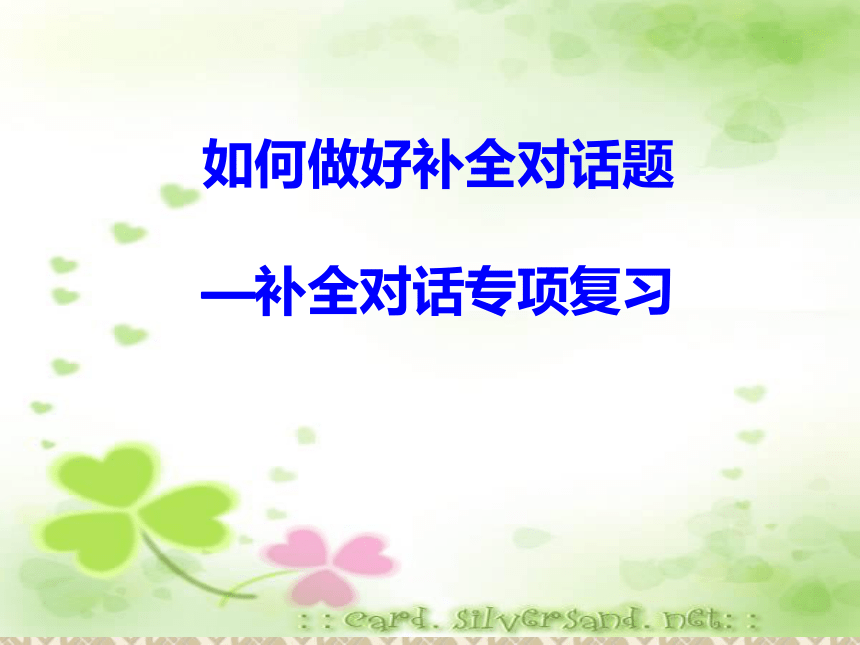
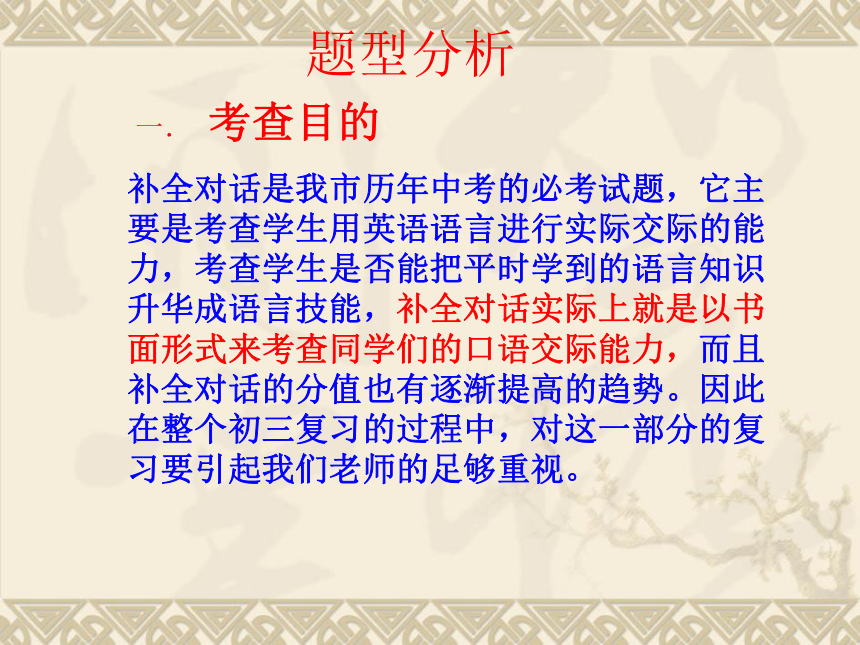
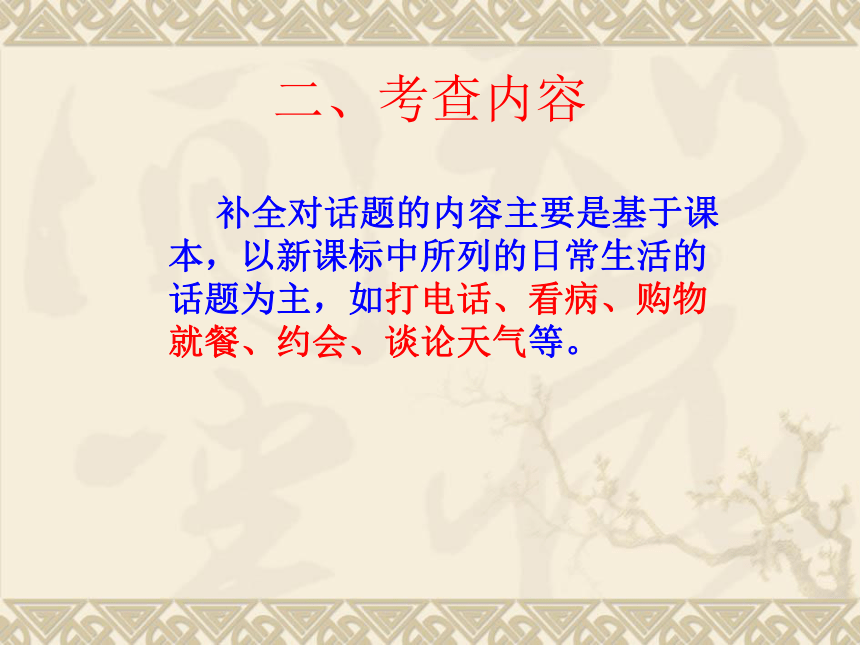
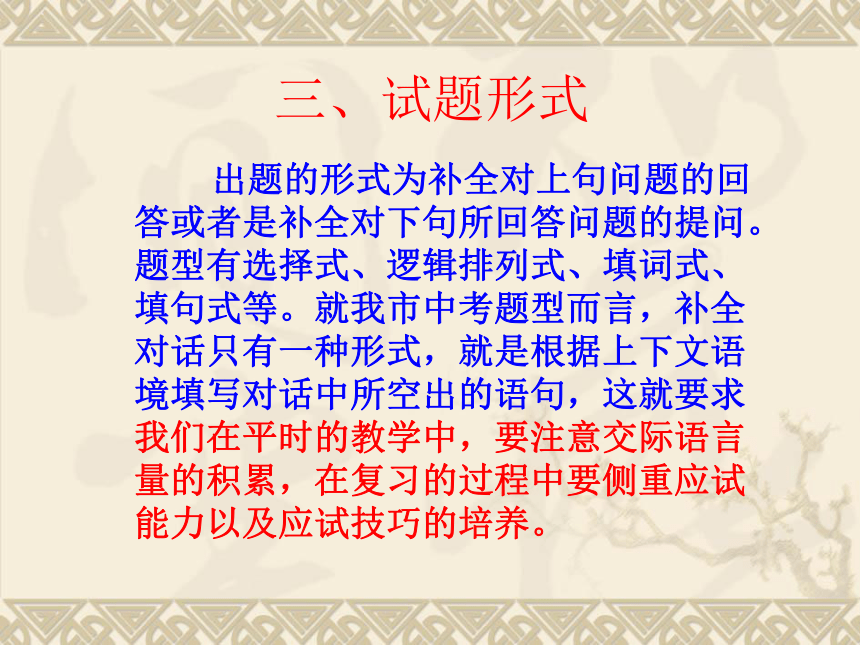
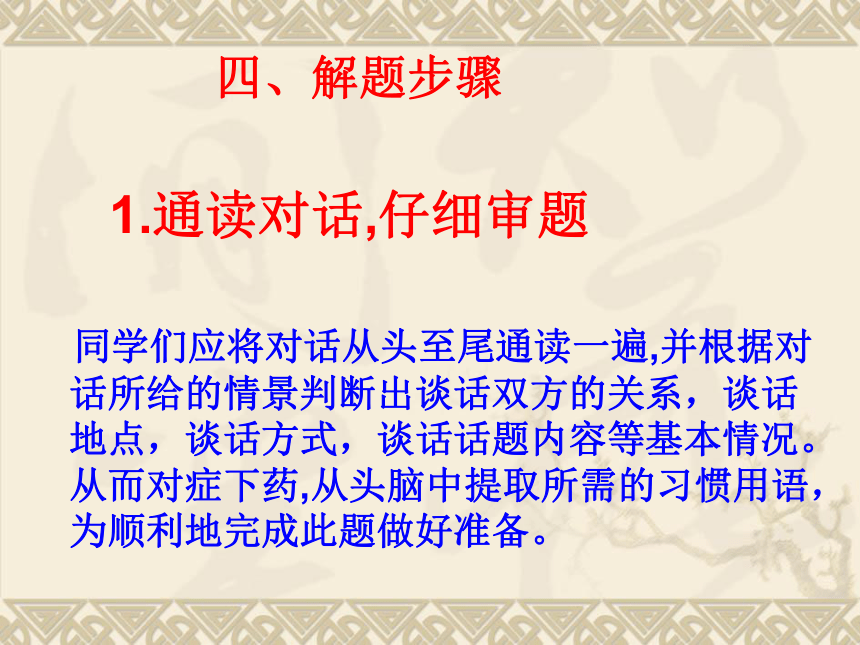
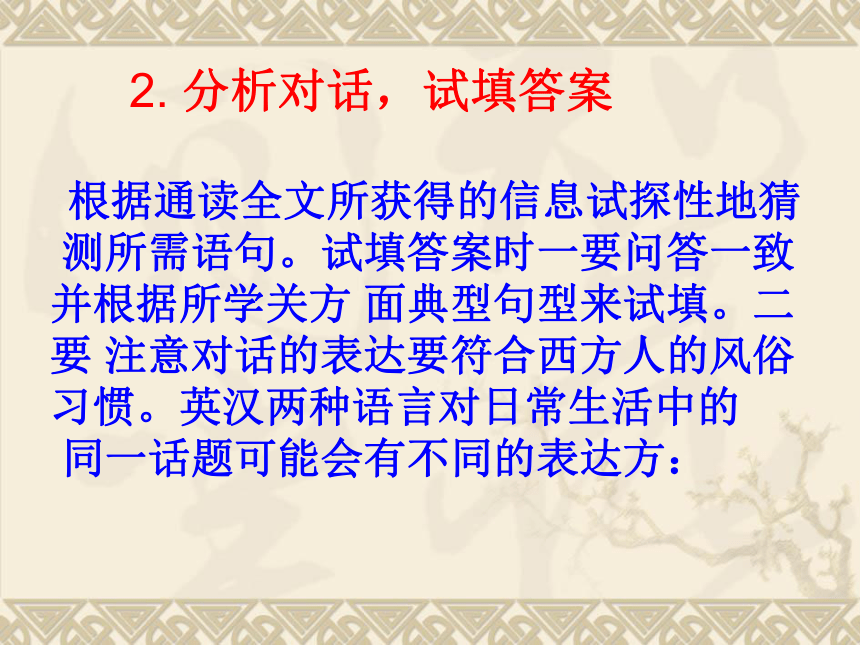
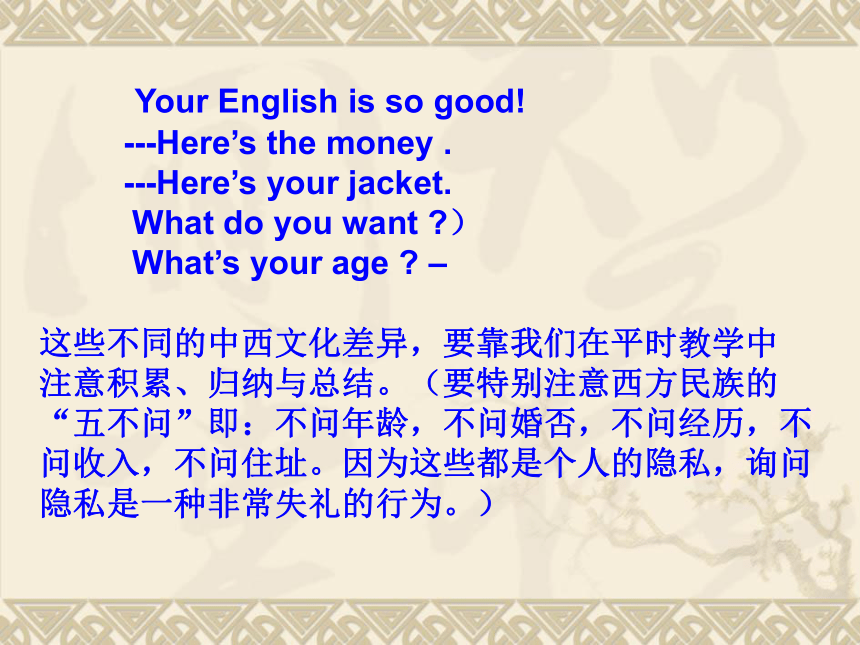
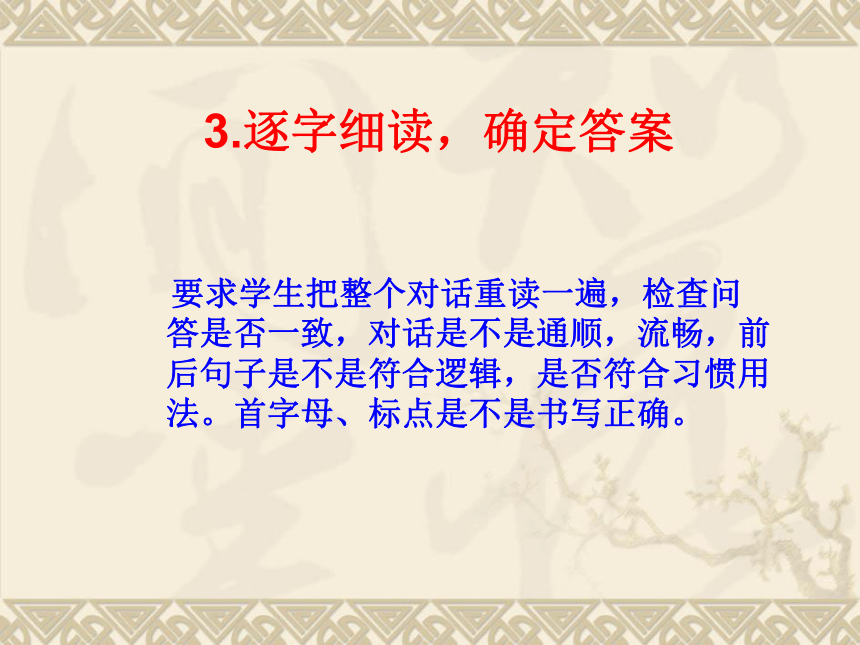
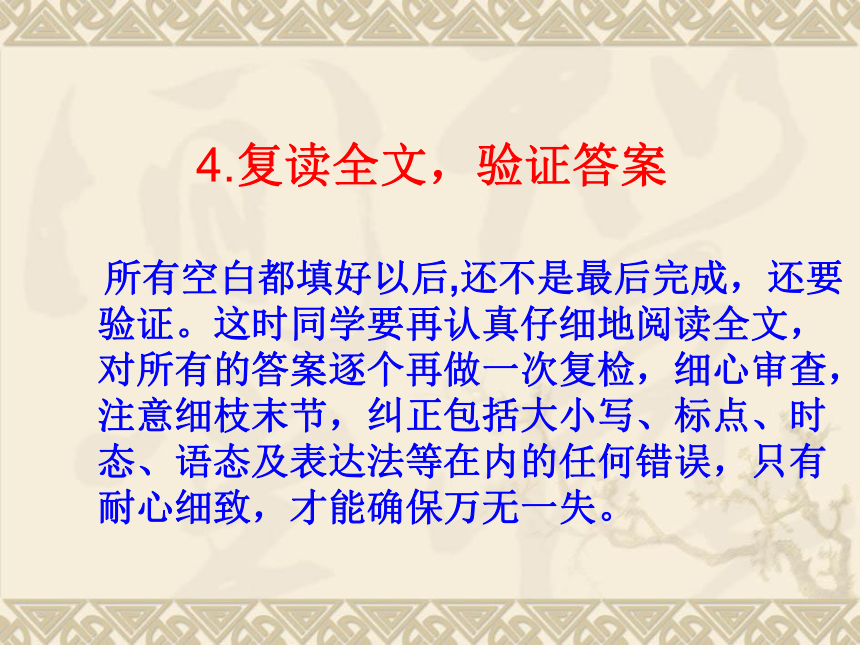
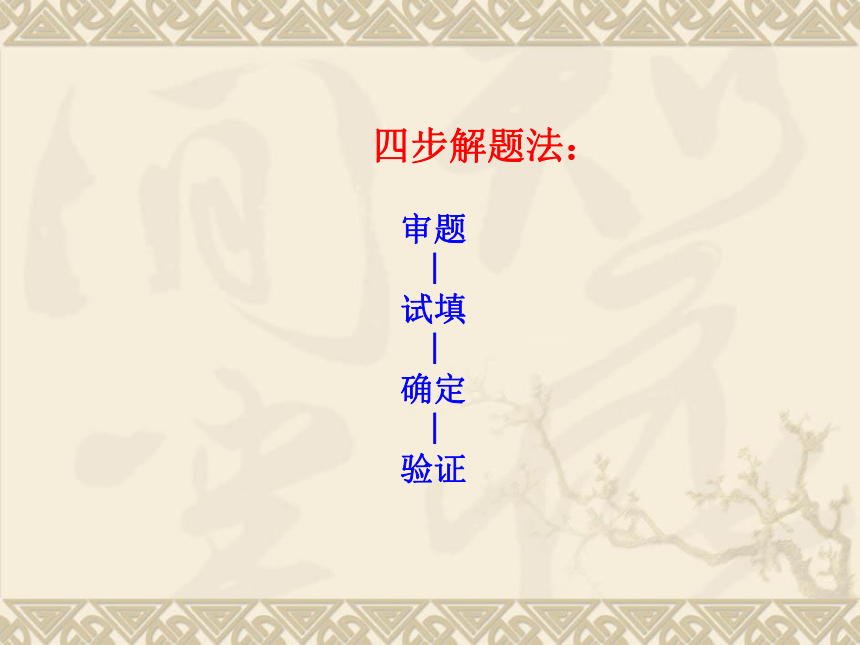
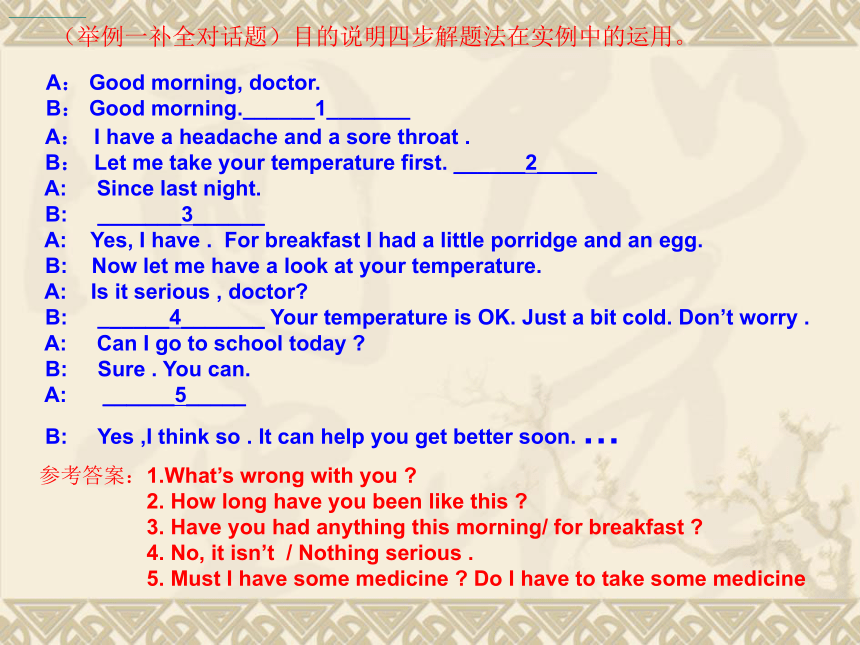
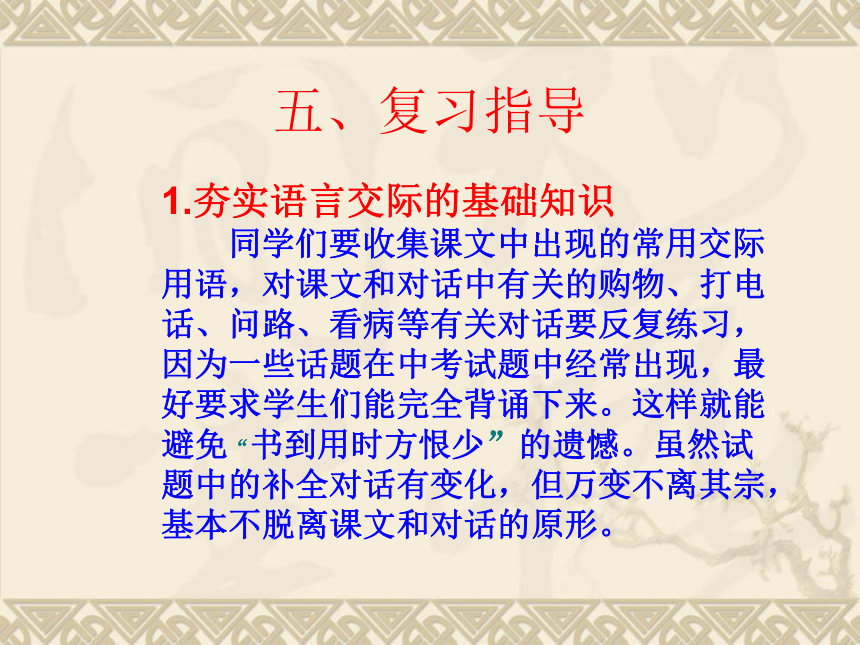
文档简介
课件32张PPT。如何做好补全对话题
—补全对话专项复习题型分析 一. 考查目的
补全对话是我市历年中考的必考试题,它主要是考查学生用英语语言进行实际交际的能力,考查学生是否能把平时学到的语言知识升华成语言技能,补全对话实际上就是以书面形式来考查同学们的口语交际能力,而且补全对话的分值也有逐渐提高的趋势。因此在整个初三复习的过程中,对这一部分的复习要引起我们老师的足够重视。二、考查内容 补全对话题的内容主要是基于课本,以新课标中所列的日常生活的话题为主,如打电话、看病、购物就餐、约会、谈论天气等。三、试题形式 出题的形式为补全对上句问题的回答或者是补全对下句所回答问题的提问。题型有选择式、逻辑排列式、填词式、填句式等。就我市中考题型而言,补全对话只有一种形式,就是根据上下文语境填写对话中所空出的语句,这就要求我们在平时的教学中,要注意交际语言量的积累,在复习的过程中要侧重应试能力以及应试技巧的培养。 1.通读对话,仔细审题
同学们应将对话从头至尾通读一遍,并根据对话所给的情景判断出谈话双方的关系,谈话地点,谈话方式,谈话话题内容等基本情况。从而对症下药,从头脑中提取所需的习惯用语, 为顺利地完成此题做好准备。
四、解题步骤 2. 分析对话,试填答案
根据通读全文所获得的信息试探性地猜
测所需语句。试填答案时一要问答一致
并根据所学关方 面典型句型来试填。二
要 注意对话的表达要符合西方人的风俗
习惯。英汉两种语言对日常生活中的
同一话题可能会有不同的表达方:
Your English is so good!
---Here’s the money .
---Here’s your jacket.
What do you want ?)
What’s your age ? –
这些不同的中西文化差异,要靠我们在平时教学中 注意积累、归纳与总结。(要特别注意西方民族的“五不问”即:不问年龄,不问婚否,不问经历,不问收入,不问住址。因为这些都是个人的隐私,询问隐私是一种非常失礼的行为。)
3.逐字细读,确定答案
要求学生把整个对话重读一遍,检查问答是否一致,对话是不是通顺,流畅,前后句子是不是符合逻辑,是否符合习惯用法。首字母、标点是不是书写正确。4.复读全文,验证答案 所有空白都填好以后,还不是最后完成,还要验证。这时同学要再认真仔细地阅读全文,对所有的答案逐个再做一次复检,细心审查,注意细枝末节,纠正包括大小写、标点、时态、语态及表达法等在内的任何错误,只有耐心细致,才能确保万无一失。 四步解题法:
审题
︱
试填
︱
确定
︱
验证(举例一补全对话题)目的说明四步解题法在实例中的运用。 A: Good morning, doctor.
B: Good morning.______1_______ A: I have a headache and a sore throat .
B: Let me take your temperature first. ______2_____
A: Since last night.
B: _______3______
A: Yes, I have . For breakfast I had a little porridge and an egg.
B: Now let me have a look at your temperature.
A: Is it serious , doctor?
B: ______4_______ Your temperature is OK. Just a bit cold. Don’t worry .
A: Can I go to school today ?
B: Sure . You can.
A: ______5_____
B: Yes ,I think so . It can help you get better soon. …
参考答案:1.What’s wrong with you ?
2. How long have you been like this ?
3. Have you had anything this morning/ for breakfast ?
4. No, it isn’t / Nothing serious .
5. Must I have some medicine ? Do I have to take some medicine五、复习指导1.夯实语言交际的基础知识 同学们要收集课文中出现的常用交际用语,对课文和对话中有关的购物、打电话、问路、看病等有关对话要反复练习,因为一些话题在中考试题中经常出现,最好要求学生们能完全背诵下来。这样就能避免“书到用时方恨少”的遗憾。虽然试题中的补全对话有变化,但万变不离其宗,基本不脱离课文和对话的原形。2.归纳总结功能相同的句型
感谢类: Thanks!
Thank you!
Thanks a lot!
Thank you very much!
Thank you very,very much!
答谢类: That’s all right . 没关系.
That’s OK. 没关系.
Not at all. 不用谢.
You are welcome.不必谢.
It’s a pleasure .
.
道歉类: Sorry.
I am sorry…
I am sorry for…
应答类: That’s all right.
It doesn’t matter .
That’s nothing.
建议类:
You had better …
Shall we do… ?
What about doing… ?
How about doing… ?
Why not do… ?
Let’s do sth … OK ?
Would you like some … ?
同意类: OK.
Sure .
Certainly .
All right .
Yes, please.
Yes, I think so .
I agree with you.
不同意类:I am afraid not. (4)
Sorry, I don’t think so. (5)
I really can’t agree with you. (6)
祝愿祝贺类 Good Luck to you!
Best wishes!
Have a good (nice) time!
Congratulations to you!
Happy Teachers’ Day!
Happy birthday to you!
Happy New Year!
Merry Christmas!
熟记“问” 字句型
问天气: What’s the weather like today?
How is the weather today?
问时间: What’s the time?
What time is it ?
问职业: What’s your father?
What’s your father’s job?
What does your father do?
问价格: What’s the price of the book?
How much is the book?
How much does the book cost?
How much should I pay for the book?
问年龄: How old are you?
What’s your age?
问地址: What do you live?
What’s your address?
问姓名: What’s your name?
Could I have your name, please?
Do you mind my knowing your name?
Do you mind if I know your name?
Can you tell me your name?
问词意: What do you mean by saying the word?
What’s the meaning of the word?
What does the word mean?
问单位: Where do you work?
What company are you working for?
问爱好: Which do you like best?
Which do you prefer?
What’s your hobby?
What’s your favorite?
问感受: What do you think of the film?
How do you like the film?
问数量: How many people are there in your family?
How much water do you drink every day?问人口: What’s the population of China ?
How many people are there in China ?
How large is the population of China ?
问路线: Which is the way to the station?
Do you know the way to the station?
Can you tell me the way to the station?
How can I get to the station?
问尺寸: What size is your sweater?
What size do you want?
What size do you need?
问距离: How far is your school from here?
How far away is your school from here?问日期:What’s the date today?
问星期:What day is it today?
问高度:How tall are you ?
What’s your height?
How high is the mountain ?
问宽度:How wide is the river?
问长度:How long is the bridge?
问体重:What’s your weight?
How much do you weigh ?
问电话:Can I know your telephone number ?
What’s your telephone number ?五、复习指导4.反复练习。 要求学生反复朗读,熟记在心。 然后再通过大量的练习加以巩固,这样就为做好本题做好了知识铺垫。但不要只简单背诵所学句式,而是应该灵活运用所学句型来解决实际问题。
要想掌握一种语言,在缺乏必要的语言环境的条件下,实在没有什么捷径可走。 概括起来,只有四个字:下苦功夫。
俗话说“熟能生巧”,“熟练”是与人会话的前提,只有熟练,在会话时才能流利。熟练的标准就是要达到不假思索地脱口而出。而英语口语要做到熟练,
温馨提示分类对话展示: (一)看病
A:Good morning.
B:Good morning. What’s wrong with you?
A:I don’t feel very well and I’ve a headache.
B:How long have you been like this?
A:Ever since this morning.
B:Maybe you’ve caught a cold. Have you taken your temperature?
A:No, I haven’t.
B:Can I take your temperature?
A:OK.
B:Oh, you’ve got a fever.
A:Is it serious?
B:Nothing serious.
A:What should I do then?
B:You can take some medicine and drink much water.
A:How often should I take this medicine?
B:You can take this medicine three times a day and you’ll be all right soon.
A:Thank you, doctor. I’ll do as you say. Bye!
B:Bye!(二)打电话
J-Jim M-Mrs Read
J:Hello. Could I speak to Ann, please?
M:Certainly. Hold on, please. Oh, I’m afraid. She isn’t here right now.
J:Can I leave a message for her?
M:Yes, please. But who is that?
J:This is Jim speaking.
M:Hello, Jim. Can I take a message for you?
J:Yes. Could you ask her to call me?
M:Sure! What’s your telephone number?
J:My telephone number is 1234567.
M:I’ll give the message to her as soon as she comes back.
J:Thank you. Good-bye!
M:Bye!(三)购物
A:Good morning. Can I help you?
B:Yes, please. I want to buy a pair of shoes. Can you show me one?
A:What size do you need?
B:Size 38.
A:How about those ones?
B:I don’t like this color. Have you got any other colors?
A:Yes. How about this one?
B:It looks nice. Can I try them on?
A:Sure.
B:Oh, it’s just right. Where is it made?
A:It’s made in Japan. It’s very comfortable.
B:How much are they?
A:100 yuan.
B:It’s too expensive. I can’t afford it. Have you got a cheaper one?
A:Well. I’m afraid it’s the cheapest one.
B:OK. I’ll take it. Here is the money.
A:Thank you. Good-bye!
B:Bye!(四)问路
A:Excuse me. Where is the nearest post office, please?
B: Sorry,I don’t know. You’d better ask the policeman over there. He may know.
A:Thank you all the same.
B:Excuse me. Which is the way to the post office, please?
C:Go down this street and take the first turning on the right. Go across the bridge and you’ll find the post office on the left. It’s between the city library and the hospital. You can’t miss it.
A:How far is it from here?
C:It’s about 30 minutes’ walk. You’d better catch a bus.
A:Which bus do I need?
C:I think you need a number 16 bus. The bus will take you there.
A:Thank you very much.
C:You’re welcome.(五)约定
A:What are you going to do next Sunday?
B:Nothing much(Nothing special).
A:Shall we go to the park and play football?
B:Good idea.
A:How can we get there?
B:By bike.
A:Where shall we meet?
B:How about meeting at the gate of our school?
A:When shall we meet?
B:At 8:30.
A:Why not meet a little earlier? Let’s make it half past seven.
B:OK.
A:See you then.
B:See you.(六)询问病情
A:Good morning. Xiao Xue!
B:Good morning. Lin Lin!
A:I don’t see Zhou Tao today. Do you know where he is?
B:Yes. He is in hospital.
A:What’s wrong with him?
B:Yesterday evening he felt terrible. He had a pain in his teeth and his father took him to the hospital.
A:What happened to him then?
B:One of his teeth is broken. The doctor took it out.
A:I’m sorry to hear that. He always eats a lot of sweets.
B:Yes. But he won’t eat them any more.
A:How is Zhou Tao feeling now?
B:I don’t know. Let’s visit him after school. OK?
A:OK!(7)聊天
A:Hello! Nice to meet you
B:Nice to meet you, too
A:What bad weather, isn’t it?
B:Yes, but I think the sun will come out later on
A:May I ask you some questions?
B:Certainly.
A:Where are you from?
B:I’m from…
A:You’re from Australia, aren’t you?
B:Yes. How did you guess?
A:The way you speak .When were you born?
B:I was born on August 8 ,1988
A:Where were you born?
B:I was born in a small village near London.
A:Why did you come to China?
B:Because my parents wanted to work in China.
A:How do you like China?
B:I like it very much.
A:What do you like about China?
B:The people and the food.
A:How is your Chinese?
B:My Chinese is just so-so. I’m trying my best to study my Chinese well.
A:That’s great .Good luck with your Chinese. (八)就餐
Waiter:Good morning ,madam
A and B:Good morning.
W:A table for two?
A:Yes.Can we sit at the table by the window?
W:OK. This way, please. Here is the menu.
A:Thank you.
W:May I take your order now?
A:Yes, We’ll have chicken with potatoes、beef 、rice and vegetable soup.
W:That’s what you ordered, please take your time (After the meal )
A:Excuse me, Could we have some tea, please ?
W:certainly. Would you like something else ?
A:No. that’s all. Could we have the bill ?
W:Of course. Sir.
A:Here is the money.
W:Thank you. Welcome you here again.(十)交通事故
A:Excuse me. What has happened?
B:A car hit an electric pole.
A:When did it happen?
B:About ten minutes ago.
A:Has anyone called the police?
B:Yes, but the police haven’t come.
A:Is anyone hurt?
B:Yes, a man is hurt, but not badly.
A:Has he gone to the hospital ?
B:No, he is waiting for the police to come. After the survey he will go to the hospital.
注:survey—调查(九)做客
H-Han Mei T-Twins L-Lily
H:Would you like a drink?
T:Yes, please.
H:I’ll get you some tea.
T:Can we do anything to help?
H:No, thanks. Here are some cookies. Help yourselves.
T:Thank you.
L:Well. I think it’s time for us to leave now?
H:Oh, do you have to?
L:Yes, I’m afraid so. It’s getting late and we have to get up early in the morning.
H:Don’t leave anything behind.
L:Thanks. I think we have everything. Thank you for having us. We enjoyed ourselves very much.
H:I’m happy you did. Bye!Thank you给大家带来帮助是我的希望,
和大家共同进步是我的愿望,
得到大家的建议是我的期望。
How‘s everything? 一切都好? What‘ sup? 近况如何? What’s new? 有什么新鲜事? What’s happening? 在忙什 么? 任何时后都可以用,但比较见外: How are you? 你好吗? 适用于第一次见面: Nice to meet you. 很高兴见到你。 适用于曾经见过,但不太熟的人: Nice to see you again. 很高兴再见第一,
寒暄语:Good morning (afternoon,evening),How are you? Howdo you
do?
How are you?是问身体健康状况如何,回答多种多样,如:I am fine,thank you.And
you?或者I am OK ( fine,all right,very well).不能用How are
you?作直接回答,但可以这样回答Fine,thank you.Howare you? How do you
do?是初次见面的双方问候语,它虽是个问句,但并不是真正的问句,相当于“你好!”讲这话时常伴随着双方互相握手。
这句话可以用问号,也可以感叹号,对于How do you do?的回答只能用How do you do?
客套语:Thanks a lot.谢谢。It’s very kind of you!十分感谢您的好意!You’re
welcome.不必谢。Not at all.不用谢。That’s allright.没关系。That’s OK.没关系。Thank you.谢谢。Help youselfto some chicken
(meat,bread).(请吃鸡肉肉,面包)。
道歉语:Sorry/I’m sorry /Excuse me, I beg your pardon?
Sorry
带有较浓的感彩,初中课本中主要含义有:由某种原因引起人的伤感时使用;由某种原因给别人带来麻烦时使用;在拒绝别人的要求、反对别人做某事时使用Sorry,以道歉的方式礼貌地拒绝别人的请求。另外Sorry
还有于听到别人不幸的消息时感到难过;I beg yourpardon?希望对方重复刚才讲过的话时用;Excuse
me.其实是一句客套用语,常用于麻烦别人的场合。
道别语:Good-bye! Good day!See you later! See you again!
Goodnight!
Good-bye 用于比较正式的场合,bye-bye 则常用于口语中;See youlater
(tomrorrow).用于短时间内还要见面;晚上分手时应说:Goodnight!晚
补全对话是我市历年中考的必考试题,它主要是考查学生用英语语言进行实际交际的能力,考查学生是否能把平时学到的语言知识升华成语言技能,补全对话实际上就是以书面形式来考查同学们的口语交际能力,而且补全对话的分值也有逐渐提高的趋势。因此在整个初三复习的过程中,对这一部分的复习要引起我们老师的足够重视。二、考查内容 补全对话题的内容主要是基于课本,以新课标中所列的日常生活的话题为主,如打电话、看病、购物就餐、约会、谈论天气等。三、试题形式 出题的形式为补全对上句问题的回答或者是补全对下句所回答问题的提问。题型有选择式、逻辑排列式、填词式、填句式等。就我市中考题型而言,补全对话只有一种形式,就是根据上下文语境填写对话中所空出的语句,这就要求我们在平时的教学中,要注意交际语言量的积累,在复习的过程中要侧重应试能力以及应试技巧的培养。 1.通读对话,仔细审题
同学们应将对话从头至尾通读一遍,并根据对话所给的情景判断出谈话双方的关系,谈话地点,谈话方式,谈话话题内容等基本情况。从而对症下药,从头脑中提取所需的习惯用语, 为顺利地完成此题做好准备。
四、解题步骤 2. 分析对话,试填答案
根据通读全文所获得的信息试探性地猜
测所需语句。试填答案时一要问答一致
并根据所学关方 面典型句型来试填。二
要 注意对话的表达要符合西方人的风俗
习惯。英汉两种语言对日常生活中的
同一话题可能会有不同的表达方:
Your English is so good!
---Here’s the money .
---Here’s your jacket.
What do you want ?)
What’s your age ? –
这些不同的中西文化差异,要靠我们在平时教学中 注意积累、归纳与总结。(要特别注意西方民族的“五不问”即:不问年龄,不问婚否,不问经历,不问收入,不问住址。因为这些都是个人的隐私,询问隐私是一种非常失礼的行为。)
3.逐字细读,确定答案
要求学生把整个对话重读一遍,检查问答是否一致,对话是不是通顺,流畅,前后句子是不是符合逻辑,是否符合习惯用法。首字母、标点是不是书写正确。4.复读全文,验证答案 所有空白都填好以后,还不是最后完成,还要验证。这时同学要再认真仔细地阅读全文,对所有的答案逐个再做一次复检,细心审查,注意细枝末节,纠正包括大小写、标点、时态、语态及表达法等在内的任何错误,只有耐心细致,才能确保万无一失。 四步解题法:
审题
︱
试填
︱
确定
︱
验证(举例一补全对话题)目的说明四步解题法在实例中的运用。 A: Good morning, doctor.
B: Good morning.______1_______ A: I have a headache and a sore throat .
B: Let me take your temperature first. ______2_____
A: Since last night.
B: _______3______
A: Yes, I have . For breakfast I had a little porridge and an egg.
B: Now let me have a look at your temperature.
A: Is it serious , doctor?
B: ______4_______ Your temperature is OK. Just a bit cold. Don’t worry .
A: Can I go to school today ?
B: Sure . You can.
A: ______5_____
B: Yes ,I think so . It can help you get better soon. …
参考答案:1.What’s wrong with you ?
2. How long have you been like this ?
3. Have you had anything this morning/ for breakfast ?
4. No, it isn’t / Nothing serious .
5. Must I have some medicine ? Do I have to take some medicine五、复习指导1.夯实语言交际的基础知识 同学们要收集课文中出现的常用交际用语,对课文和对话中有关的购物、打电话、问路、看病等有关对话要反复练习,因为一些话题在中考试题中经常出现,最好要求学生们能完全背诵下来。这样就能避免“书到用时方恨少”的遗憾。虽然试题中的补全对话有变化,但万变不离其宗,基本不脱离课文和对话的原形。2.归纳总结功能相同的句型
感谢类: Thanks!
Thank you!
Thanks a lot!
Thank you very much!
Thank you very,very much!
答谢类: That’s all right . 没关系.
That’s OK. 没关系.
Not at all. 不用谢.
You are welcome.不必谢.
It’s a pleasure .
.
道歉类: Sorry.
I am sorry…
I am sorry for…
应答类: That’s all right.
It doesn’t matter .
That’s nothing.
建议类:
You had better …
Shall we do… ?
What about doing… ?
How about doing… ?
Why not do… ?
Let’s do sth … OK ?
Would you like some … ?
同意类: OK.
Sure .
Certainly .
All right .
Yes, please.
Yes, I think so .
I agree with you.
不同意类:I am afraid not. (4)
Sorry, I don’t think so. (5)
I really can’t agree with you. (6)
祝愿祝贺类 Good Luck to you!
Best wishes!
Have a good (nice) time!
Congratulations to you!
Happy Teachers’ Day!
Happy birthday to you!
Happy New Year!
Merry Christmas!
熟记“问” 字句型
问天气: What’s the weather like today?
How is the weather today?
问时间: What’s the time?
What time is it ?
问职业: What’s your father?
What’s your father’s job?
What does your father do?
问价格: What’s the price of the book?
How much is the book?
How much does the book cost?
How much should I pay for the book?
问年龄: How old are you?
What’s your age?
问地址: What do you live?
What’s your address?
问姓名: What’s your name?
Could I have your name, please?
Do you mind my knowing your name?
Do you mind if I know your name?
Can you tell me your name?
问词意: What do you mean by saying the word?
What’s the meaning of the word?
What does the word mean?
问单位: Where do you work?
What company are you working for?
问爱好: Which do you like best?
Which do you prefer?
What’s your hobby?
What’s your favorite?
问感受: What do you think of the film?
How do you like the film?
问数量: How many people are there in your family?
How much water do you drink every day?问人口: What’s the population of China ?
How many people are there in China ?
How large is the population of China ?
问路线: Which is the way to the station?
Do you know the way to the station?
Can you tell me the way to the station?
How can I get to the station?
问尺寸: What size is your sweater?
What size do you want?
What size do you need?
问距离: How far is your school from here?
How far away is your school from here?问日期:What’s the date today?
问星期:What day is it today?
问高度:How tall are you ?
What’s your height?
How high is the mountain ?
问宽度:How wide is the river?
问长度:How long is the bridge?
问体重:What’s your weight?
How much do you weigh ?
问电话:Can I know your telephone number ?
What’s your telephone number ?五、复习指导4.反复练习。 要求学生反复朗读,熟记在心。 然后再通过大量的练习加以巩固,这样就为做好本题做好了知识铺垫。但不要只简单背诵所学句式,而是应该灵活运用所学句型来解决实际问题。
要想掌握一种语言,在缺乏必要的语言环境的条件下,实在没有什么捷径可走。 概括起来,只有四个字:下苦功夫。
俗话说“熟能生巧”,“熟练”是与人会话的前提,只有熟练,在会话时才能流利。熟练的标准就是要达到不假思索地脱口而出。而英语口语要做到熟练,
温馨提示分类对话展示: (一)看病
A:Good morning.
B:Good morning. What’s wrong with you?
A:I don’t feel very well and I’ve a headache.
B:How long have you been like this?
A:Ever since this morning.
B:Maybe you’ve caught a cold. Have you taken your temperature?
A:No, I haven’t.
B:Can I take your temperature?
A:OK.
B:Oh, you’ve got a fever.
A:Is it serious?
B:Nothing serious.
A:What should I do then?
B:You can take some medicine and drink much water.
A:How often should I take this medicine?
B:You can take this medicine three times a day and you’ll be all right soon.
A:Thank you, doctor. I’ll do as you say. Bye!
B:Bye!(二)打电话
J-Jim M-Mrs Read
J:Hello. Could I speak to Ann, please?
M:Certainly. Hold on, please. Oh, I’m afraid. She isn’t here right now.
J:Can I leave a message for her?
M:Yes, please. But who is that?
J:This is Jim speaking.
M:Hello, Jim. Can I take a message for you?
J:Yes. Could you ask her to call me?
M:Sure! What’s your telephone number?
J:My telephone number is 1234567.
M:I’ll give the message to her as soon as she comes back.
J:Thank you. Good-bye!
M:Bye!(三)购物
A:Good morning. Can I help you?
B:Yes, please. I want to buy a pair of shoes. Can you show me one?
A:What size do you need?
B:Size 38.
A:How about those ones?
B:I don’t like this color. Have you got any other colors?
A:Yes. How about this one?
B:It looks nice. Can I try them on?
A:Sure.
B:Oh, it’s just right. Where is it made?
A:It’s made in Japan. It’s very comfortable.
B:How much are they?
A:100 yuan.
B:It’s too expensive. I can’t afford it. Have you got a cheaper one?
A:Well. I’m afraid it’s the cheapest one.
B:OK. I’ll take it. Here is the money.
A:Thank you. Good-bye!
B:Bye!(四)问路
A:Excuse me. Where is the nearest post office, please?
B: Sorry,I don’t know. You’d better ask the policeman over there. He may know.
A:Thank you all the same.
B:Excuse me. Which is the way to the post office, please?
C:Go down this street and take the first turning on the right. Go across the bridge and you’ll find the post office on the left. It’s between the city library and the hospital. You can’t miss it.
A:How far is it from here?
C:It’s about 30 minutes’ walk. You’d better catch a bus.
A:Which bus do I need?
C:I think you need a number 16 bus. The bus will take you there.
A:Thank you very much.
C:You’re welcome.(五)约定
A:What are you going to do next Sunday?
B:Nothing much(Nothing special).
A:Shall we go to the park and play football?
B:Good idea.
A:How can we get there?
B:By bike.
A:Where shall we meet?
B:How about meeting at the gate of our school?
A:When shall we meet?
B:At 8:30.
A:Why not meet a little earlier? Let’s make it half past seven.
B:OK.
A:See you then.
B:See you.(六)询问病情
A:Good morning. Xiao Xue!
B:Good morning. Lin Lin!
A:I don’t see Zhou Tao today. Do you know where he is?
B:Yes. He is in hospital.
A:What’s wrong with him?
B:Yesterday evening he felt terrible. He had a pain in his teeth and his father took him to the hospital.
A:What happened to him then?
B:One of his teeth is broken. The doctor took it out.
A:I’m sorry to hear that. He always eats a lot of sweets.
B:Yes. But he won’t eat them any more.
A:How is Zhou Tao feeling now?
B:I don’t know. Let’s visit him after school. OK?
A:OK!(7)聊天
A:Hello! Nice to meet you
B:Nice to meet you, too
A:What bad weather, isn’t it?
B:Yes, but I think the sun will come out later on
A:May I ask you some questions?
B:Certainly.
A:Where are you from?
B:I’m from…
A:You’re from Australia, aren’t you?
B:Yes. How did you guess?
A:The way you speak .When were you born?
B:I was born on August 8 ,1988
A:Where were you born?
B:I was born in a small village near London.
A:Why did you come to China?
B:Because my parents wanted to work in China.
A:How do you like China?
B:I like it very much.
A:What do you like about China?
B:The people and the food.
A:How is your Chinese?
B:My Chinese is just so-so. I’m trying my best to study my Chinese well.
A:That’s great .Good luck with your Chinese. (八)就餐
Waiter:Good morning ,madam
A and B:Good morning.
W:A table for two?
A:Yes.Can we sit at the table by the window?
W:OK. This way, please. Here is the menu.
A:Thank you.
W:May I take your order now?
A:Yes, We’ll have chicken with potatoes、beef 、rice and vegetable soup.
W:That’s what you ordered, please take your time (After the meal )
A:Excuse me, Could we have some tea, please ?
W:certainly. Would you like something else ?
A:No. that’s all. Could we have the bill ?
W:Of course. Sir.
A:Here is the money.
W:Thank you. Welcome you here again.(十)交通事故
A:Excuse me. What has happened?
B:A car hit an electric pole.
A:When did it happen?
B:About ten minutes ago.
A:Has anyone called the police?
B:Yes, but the police haven’t come.
A:Is anyone hurt?
B:Yes, a man is hurt, but not badly.
A:Has he gone to the hospital ?
B:No, he is waiting for the police to come. After the survey he will go to the hospital.
注:survey—调查(九)做客
H-Han Mei T-Twins L-Lily
H:Would you like a drink?
T:Yes, please.
H:I’ll get you some tea.
T:Can we do anything to help?
H:No, thanks. Here are some cookies. Help yourselves.
T:Thank you.
L:Well. I think it’s time for us to leave now?
H:Oh, do you have to?
L:Yes, I’m afraid so. It’s getting late and we have to get up early in the morning.
H:Don’t leave anything behind.
L:Thanks. I think we have everything. Thank you for having us. We enjoyed ourselves very much.
H:I’m happy you did. Bye!Thank you给大家带来帮助是我的希望,
和大家共同进步是我的愿望,
得到大家的建议是我的期望。
How‘s everything? 一切都好? What‘ sup? 近况如何? What’s new? 有什么新鲜事? What’s happening? 在忙什 么? 任何时后都可以用,但比较见外: How are you? 你好吗? 适用于第一次见面: Nice to meet you. 很高兴见到你。 适用于曾经见过,但不太熟的人: Nice to see you again. 很高兴再见第一,
寒暄语:Good morning (afternoon,evening),How are you? Howdo you
do?
How are you?是问身体健康状况如何,回答多种多样,如:I am fine,thank you.And
you?或者I am OK ( fine,all right,very well).不能用How are
you?作直接回答,但可以这样回答Fine,thank you.Howare you? How do you
do?是初次见面的双方问候语,它虽是个问句,但并不是真正的问句,相当于“你好!”讲这话时常伴随着双方互相握手。
这句话可以用问号,也可以感叹号,对于How do you do?的回答只能用How do you do?
客套语:Thanks a lot.谢谢。It’s very kind of you!十分感谢您的好意!You’re
welcome.不必谢。Not at all.不用谢。That’s allright.没关系。That’s OK.没关系。Thank you.谢谢。Help youselfto some chicken
(meat,bread).(请吃鸡肉肉,面包)。
道歉语:Sorry/I’m sorry /Excuse me, I beg your pardon?
Sorry
带有较浓的感彩,初中课本中主要含义有:由某种原因引起人的伤感时使用;由某种原因给别人带来麻烦时使用;在拒绝别人的要求、反对别人做某事时使用Sorry,以道歉的方式礼貌地拒绝别人的请求。另外Sorry
还有于听到别人不幸的消息时感到难过;I beg yourpardon?希望对方重复刚才讲过的话时用;Excuse
me.其实是一句客套用语,常用于麻烦别人的场合。
道别语:Good-bye! Good day!See you later! See you again!
Goodnight!
Good-bye 用于比较正式的场合,bye-bye 则常用于口语中;See youlater
(tomrorrow).用于短时间内还要见面;晚上分手时应说:Goodnight!晚
同课章节目录
